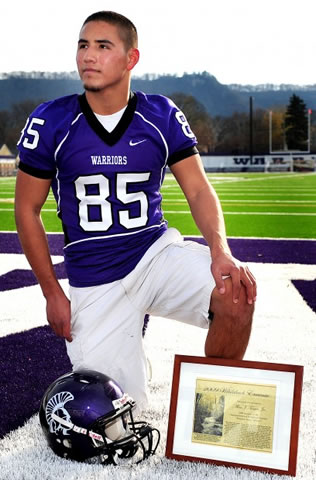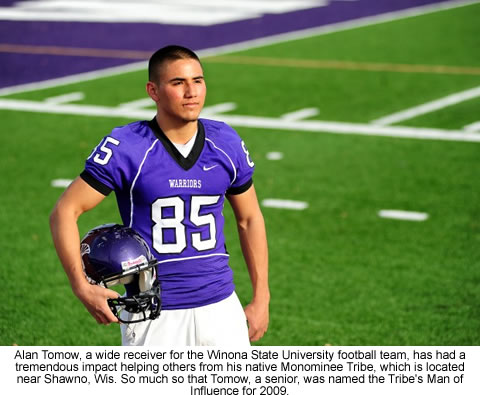 |
Canku Ota
|
 |
|
(Many Paths)
|
||
|
An Online Newsletter
Celebrating Native America
|
||
|
December 1, 2009 - Volume
7 Number 12
|
||
|
|
||
|
Tomow's Influence
Extends Beyond Football Field
|
||
|
by Jeff Brown - Winona
(MN) Daily News
|
||
|
His impact as a Native American, however, reaches far beyond the Maxwell Field end zones. Tomow, who grew up on a reservation near Shawano, Wis., as a member of the Menominee Tribe, has influenced far bigger things than the outcome of a football game. He
has changed lives. To him, his family and those who know him, this means more than an all-conference, all-region or all-America football award. "I am definitely humbled by it and can take a lot of pride in it," Tomow said. "I have never been one to do things for recognition." To understand Tomow, you have to step back to his early years, his growing years, the formative years of his life. Years where his mother, Cheryl Wynos, was raising three kids by age 21, and eventually seeing that number grow to six. And doing it in a three-bedroom mobile home. Life on the reservation does not compare to what most of Tomow's other Winona State teammates were experiencing. There was no Pop Warner football or Little League baseball. "Growing up, I really didn't have anything to compare it to. I know how hard my parents, my mom, had to work to give us the things we had," said Tomow, the second-oldest child whose mother and father split when he was 4. "If we had financial problems, she did a great job of not letting us know it." Tomow attended public grade school but struggled in many areas, including discipline. He then went to school on the reservation and did an about-face. "He had a hard time (early in school), but after I switched him over to the tribal school, he did a 360," Wynos said. "After the second grade it was amazing how much of a change he made." On the reservation, however, there were many challenges, Wynos said. "Living on the reservation, your kids have to deal with a lot of things, as I'm sure other kids do, too," Wynos said. "The gangs, the alcohol, the drugs. And the peer pressure is so bad." None of this infiltrated Tomow's head or his body. He stood firm and walked a different path.
It was one more example of Alan choosing the right path. "I don't know if everybody thinks like this, but I don't want to make bad decisions," Tomow said. "I never drank before, and I never smoked or any of that. I don't plan on it. "I want my brothers and sisters to think, that if anything bad happens, they don't have to do that. I want that (being straight) is OK for them. When they get in high school and their friends pressure them or maybe they they feel the urge to do it, I want them to remember, 'Alan didn't do it. It's OK not to do it.'" Living a pure lifestyle is tough in high school, but it may be even more challenging in college. Tomow has stood his ground, and his teammates - and his coaches - respect him for it, WSU coach Tom Sawyer said. "It is so positive to see the respect they have given him for who he is. To be 100 percent straight - tobacco-free, alcohol-free - and not to fall to the pressure, it is very difficult," Sawyer said. "What he has done outside of football with his life is going to have a far greater impact on himself, and others, than most of us can imagine. He is a model student." And a well-liked teammate. Tomow doesn't see the field often for WSU, but when he does his teammates are behind him. That would help explain why after he caught a seemingly meaningless 12-yard pass late in a 70-7 rout of Minnesota-Crookston two weeks ago, the Warriors sideline erupted. Getting to Winona, however, was a long and challenging road. In order to have a better chance at attending college, Cheryl and Alan had a tough decision to make in Alan's teenage years. They decided to send him to high school off the reservation. "The culture shock of me going to school on the reservation with 99.9 percent Native Americans to all of a sudden going to Shawano where there is probably 5 percent Native Americans at the high school, that was tough," Alan said. "It was probably as tough of an adjustment as I have had to make, leaving all of my friends behind at home and knowing things were going to be different from that day on. The things I was going to learn, the things they were going to learn, was going to be different. "When I went to a smaller (reservation) school, I thought that everything I was doing and the way I thought, I assumed it was normal. To get out into a bigger culture, at the bigger school, there are a lot of different views and attitudes." Every day, Alan drove by the reservation high school on his way to Shawano High School. Every day he thought about what he was leaving behind and the new world he was entering. Every day he was determined to make good decisions. "He grew up in a very hard place, and when I think about where he is at and what he has done, it is amazing," Wynos said. "I raised six kids in a three-bedroom mobile home, and none of them ever complained." It didn't take the outgoing Tomow long to adjust to a public high school. He was voted class president his sophomore, junior and senior years. As a senior, he ranked 16th out of 260 students. Alan Tomow was on his way to making a difference in the world. At Winona State, he has continued on that path. An exercise and sports science major, he is on target to graduate in May 2010. He plans to continue his education and earn a master's degree. In between his college years he returns to the reservation. For two years, he headed a program on the reservation where 100 people, ages 14 to 20, were part of a job training program. They were put in entry level jobs throughout the community. "It (Native American) is definitely a culture that needs to be shown some direction. That has been a goal of mine for a long time, to change the culture where I live," Tomow said. "Make coming to college, setting goals and working hard as reachable goals. I want that to be the norm." |
|
|
||
|
|
||
| Canku Ota is a free Newsletter celebrating Native America, its traditions and accomplishments . We do not provide subscriber or visitor names to anyone. Some articles presented in Canku Ota may contain copyright material. We have received appropriate permissions for republishing any articles. Material appearing here is distributed without profit or monetary gain to those who have expressed an interest. This is in accordance with Title 17 U.S.C. Section 107. | ||
|
Canku Ota is a copyright ©
2000, 2001, 2002, 2003, 2004, 2005, 2006, 2007, 2008, 2009 of Vicki
Barry and Paul Barry.
|
||
 |
 |
|
|
The "Canku
Ota - A Newsletter Celebrating Native America" web site and
its design is the
|
||
|
Copyright ©
1999, 2000, 2001, 2002, 2003, 2004, 2005,
2006, 2007, 2008, 2009 of Paul
C. Barry.
|
||
|
All Rights Reserved.
|
||
 Alan
Tomow never is going to be an All-American player for the Winona
State University football team. In fact, his playing time as a
wide receiver has been sparse the past three seasons.
Alan
Tomow never is going to be an All-American player for the Winona
State University football team. In fact, his playing time as a
wide receiver has been sparse the past three seasons.
 A
straight path.
A
straight path.